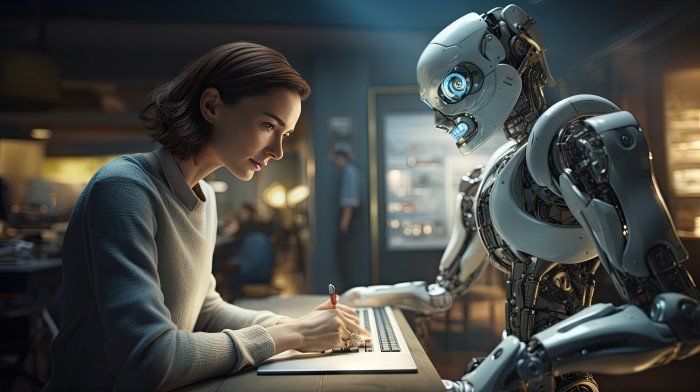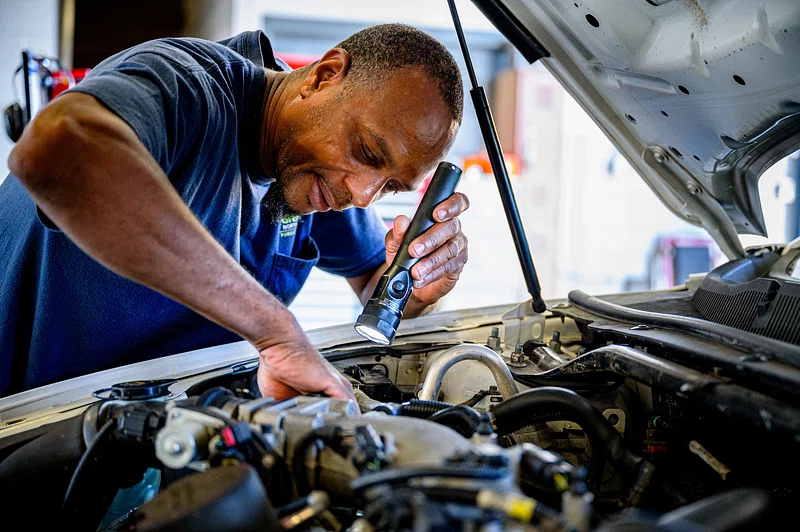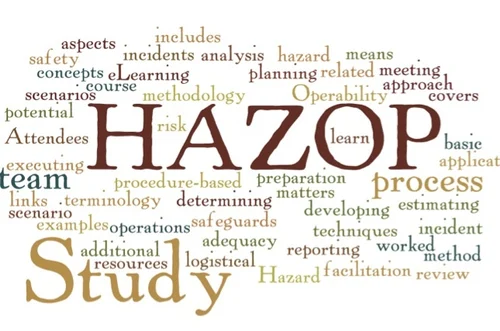AI and Human Jobs: The Future of Work You Need to Prepare For
AI and Human Jobs: The Future of Work You Need to Prepare For

An urgent threat that has raised a red flag globally is whether or not robots have the potential to take our jobs. Research states that Artificial Intelligence (AI) might bear the probability of replacing over 300 million full-time jobs. But, for several individuals, work moves seamlessly. So, are these hypes true? Or are we reaching the edge with the recent AI advancements? So, will AI replace human jobs, or will it help and accelerate our overall abilities?
The massive AI adoption has paved new pathways for new jobs and made workers more productive; however, these transitions are associated with costs. A ResumeBuilder survey conducted in 2023 discovered that 37% of the companies are using AI-replaced workers with the technology, and 44% projected AI-based layoffs in the past year. So, aren’t the machines on the surprise? They are rising at a slower pace than a few of the more breathless media coverage that might get you to believe that AI-powered technology is going to steal their jobs!
How AI Is Transforming The Workforce
Artificial Intelligence (AI) has had a notable impact in the past couple of years. Progressive AI has the potential to positively and negatively impact the next generation of workers. The World Economic Forum’s survey, “The Future of Jobs Report 2020,” projected that AI would replace 85 million global jobs by 2025. A similar report shows that AI can generate about 97 million new roles.
However, the type of jobs created by AI is projected to differ from the ones that are lost. New graduates are entering different workforce types, including data entry and processing positions, which are often seen as entry-level positions for graduates and people making a move in their careers. These positions are automated through AI, putting recent graduates in an interesting position to enter the workforce.
Effect of Artificial Intelligence on Employment
There are high concerns about the future of employment and the type of work in the future since more of these technologies are being developed. In the challenging connections between employment and AI, we will not check out the possibility of the tech revolutions as they continue to go.
Role Reversal
Traditionally, human employees perform routine, elementary tasks, while robots undertake more progressive, knowledge-based work. However, there is a shift from this fiscal year in the relationship with the latest addition of automation and AI. It is predicted that both algorithms based on artificial intelligence and robotic systems can carry out vast numbers of previously human-only operations.
Industrial Revolution
AI should be regarded as a way to improve human intelligence and increase working efficiency. Like factories and machinery that arrived with the Industrial Revolution, AI becomes a tool of production that assists a person in performing the work of multiple people. AI may also be used to scale up productivity and, in turn, change modes of running and managing enterprises of any size.
Efficient Job Functions
The functions of jobs are also approaching a phase of transformation within the adopted AI technology. One million developers use GitHub’s copilot to generate codes, which has added a new dimension to code generation. In fields such as laws and financial services, manual research is now minimal because of the connection with applications native to AI, and professionals will optimize the other more massive processes to achieve otherwise unattainable efficiency.
Sustainable Business Models
Increasing concentrations of productivity enable optimal pricing strategies across various verticals in many industries, such as generative AI. It is important to note that employees are much more productive and efficient in pursuing new levels of innovation and creativity. The layer of research and infrastructure of generative AI represents one of the more proper systematic efforts to take AI from the sphere of hype to more viable business models that will create a positive impact on the world of work—for employers as well as employees.
AI-powered Peer-to-peer Channel
Generative AI proves effective in accelerating applied and individualized learning in and out of the workplace. With books and courses soon disappearing, the same is true for linear career paths that increase peer-to-peer and machine-driven learning. GenAI impacts overall skill development and learning in the same way that Instagram, YouTube, and TikTok capitalized on smartphone proliferation and enabled individuals to share their lives through narratives.
Transformation of Decision Making
AI proves revolutionary in terms of molding the decision making process of businesses. It fuels more stimulations feeding into the insights and advice into the commercial decisions like operational ones, pricing schemes like optimizing the logistics and routine and more intricate ones like engineering solutions or discovering design to a distinctive brief. Digital representations of the businesses and the potential AIs stay capable of making decisions about the operations of the companies.
Reduction of Junior and Mid-level Roles
Large language models (LLMs) quickly impact the workforce by significantly reducing the number of software engineers needed to construct and ship new digital products. Since software engineers heavily rely on their superiors, businesses are seeking to reduce the number of staff members like data scientists and coders.
AI on the Future of Work
Numerous studies show that we are still far from completely adopting AI in place of human intelligence, as it theoretically replaces human employees. AI creates greater scope for employment, and not less so if there is an investment across different sectors or anywhere focusing on the training or upskilling of the workforce. Recently, 34% of businesses are employing AI, with 42% exploring the technology. More than half of the organizations that are using AI-based tech have mentioned boosted productivity. Therefore, how is AI influencing different industries?
Finance
AI is undoubtedly streamlining processes while boosting efficiency. It helps with task automation, such as processing loans and detecting fraud, while offering individualized investment advice driven by advanced algorithms.
AI-powered risk management solutions identify and reduce financial risks. Algorithmic trading even helps make financial decisions quickly and precisely. But for AI to recognize its full potential across financial verticals, ethics problems centered around algorithm bias and the possibility of job displacement across distinctive industries need to be resolved.
Medical
The various AI benefits related to medicine are subject to constant research. The entire medical industry has a huge amount of data that might be used to create healthcare-related predictive models. Across different diagnostic scenarios, AI has proven to be highly effective compared to physicians. For instance, a lung cancer AI system offers early warning of disease onset.
Automotive
The invention of autonomous cars and navigation systems has revealed AI’s influence on the automotive industry. AU will notably impact production in this industry.
Cybersecurity
Across cybersecurity, both Machine Learning and AI form the intricate technologies that help to detect and foresee the threats. Considering its ability to analyze the massive array of data and the forecast to detect fraud, AI is a critical tool to help with financial security.
E-Commerce
AI will be important for e-commerce in the future in various areas, including marketing, distribution, fulfillment, and user experience. It may play a major part in driving e-commerce. Examples include shopper personalization, chatbots, automated warehouses, image-based targeting advertising, and inventory management.
Hospitality and Tourism
Since AI may automate a few specific jobs like the fundamental guest communication and the check-in processes it is often unlikely to replace the human interactions entirely. Instead, we foresee a move towards visitor personalization driven through AI. Consider AI to use guest data to create personalized activity, restaurants, and recommendations for local experiences.
How AI Will Create Jobs
AI employs many humans to train and adapt its algorithms, while the problem that disrupts democratic processes only affects a related number. These developments have led to the development of roles that were not present in the past but, due to change, exist today. Machine learning engineers must create and manage AI systems, while AI ethicists ensure that AI systems work ethically.
World Economic Forum, conducting a recent global survey, found out that half of the companies believe that AI will create new jobs in the next five years. Half expect gains, and only a quarter expect to make their money go in the other direction – losing. Still, even these negative organizations can incorporate AI-related workers, said researchers. Most promising are cybersecurity and auditing. Unfortunately, the use and advancement of Artificial Intelligence will push the need for security professionals to address possible threats or risks and secure important data and physical infrastructure assets.
As The New York Times pointed out not long ago, no one has a flawless crystal ball when it comes to AI and work. Luckily, the tech industry understands that technology never overstates the results of its innovations. But everyone agrees that big changes are coming. AI will be a normal part of many careers.
Wrapping Up
Emerging nations should engage with AI and digital innovation and should orient their economies for a better future. Enhancing the economic sectors for future liabilities of emerging nations’ job sector should prepare the workforce of the nation as it will be based on AI, data-driven methods, and automation, which will mainly emphasize a lifelong learning economy. But a lot of things give cause for concern when it comes to AI. However, if the future being depicted here is dystopian, it will not be because this was the only way AI had to become. It will be because we did not fully understand how this technology can be built and applied, and how it can benefit the workers instead of the automation of their jobs. Knowledge of this is the first step towards the appropriate type of AI revolution.







